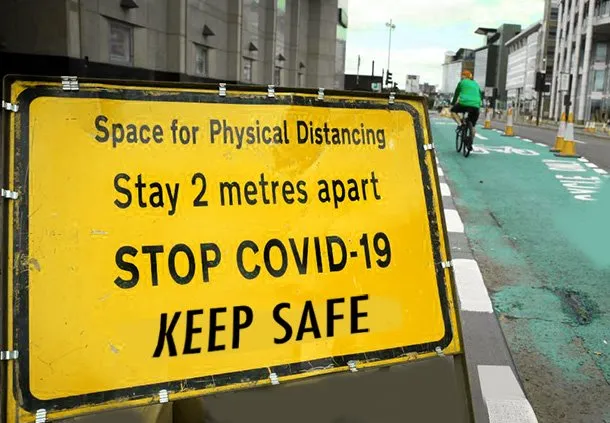If you go out -- we were and still are told -- then stay 6ft/2 meters apart. Government, medical and media personalities have repeated this for months. We need to keep our distance from the super-deadly COVID-19. If you didn't, you would face a CAD$1,000 ticket where I live.

Source
People are being 'allowed' to go back to work in many sectors of the economy in various countries. But there is still the 6 ft/2 meter rule being enforced in almost all businesses in countries like Canada and the UK, among others. I am not sure if it's the case for all the USA, but it's still in place in many states. How lucky are we, to be allowed to go back to work, according to the government dictates letting us. We sure are free people, being forced into poverty.
Anyways, it's ridiculous that they still want to enforce this. Protests are being encouraged by many left-leaning personalities in the media and governments. People aren't social distancing, and the 'rule' and imaginary 'laws' to enforce the rule with fined or arrest, are not being applied. Unless, you aren't a protester. If you are out buying food and not protesting or rioting, then you are a rule-breaker looking to get fines or arrested.
Two researchers from Oxford's Centre for Evidence-Based Medicine have put out an article (full article here) to object to the 6 ft/2 meter "social distancing" rule we've all been forced to adopt. If you want to go into a store, and not have people call the police to arrest you, then you have to obey.
Social distancing has become the norm, they write. Once inside, some people are keen to avoid coming too close to others. I simply walk to where I need to go. I don't curve and dodge people that come close by. Many people are convinced without-a-doubt that they need to social distance.
The Lancet did a review with 172 studies in support of physical distancing of 1 or more meters (3 or more feet). They note:
but all the studies were retrospective and suffer from biases that undermine the reliability of their findings. Recall bias arises in research when participants do not remember previous events accurately, and it is problematic when studies look back in time at how people behaved, including how closely they stood from others.
But even then, only 5 were about COVID-19 exposure, with "a total of merely 477 patients, with just 26 actual cases of infection." One study alone specified a distance of 6 feet when someone breached it to come into contact with a patient.
The result showed no effect of distance on contracting Covid.
In another study of 121 healthcare workers exposed to a patient with unrecognised Covid-19, three workers went on to test positive. Yet all three had unprotected patient contact: two never wore a facemask, respirator, eye protection or gown, making it impossible to identify the specific effects of distance.
On further independent inspection of 15 studies included in the review, we found multiple inconsistencies in the data, numerical mistakes and unsound methods in 13 of them. When assumptions over distance were made, we could not replicate any of them.
The researchers agree with the Lancet and CDC who ask for more "robust randomised trials are needed to better inform the evidence for [social distancing] interventions". One thing the evidence does so far show is that healthcare environments carry a higher risk of infection. But "what the evidence cannot say is that there is any measured distance that reduces your risk."
The researchers end by saying "handwashing and encouragement are what we need, not formalised rules. This means trying to keep a distance from each other where possible and avoiding spending time indoors in crowded places."
The best known way to avoid getting sick from any virus, is to not touch your face, eyes, nose or mouth, and wash you hands when getting back home or before you do touch your facial areas. But some "experts" still want to force people to wear masks or socially distance. And the repeated message in the media and appeal to authority has many convinced that not doing it is tantamount to harming other people.
I don't mind backing up if someone has an issue with me being closer than the sacred "6 ft/2 meters". I often get to 3-5 feet away from people. I am not afraid of contracting COVID-19 and having to get over the illness. So far, I haven't gotten it despite my apathy for the 'rules'. I don't wear a mask, but I do lightly wash (more of a rinse lol) my hands when I get back home. I laugh when I see the face shield people walking around, or people wearing masks and gloves in 30 degree Celsius heat. People are truly afraid, and that's thanks to the media's fear-hype FUD narrative.
